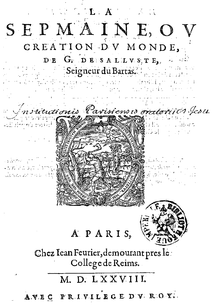- Guillaume de Salluste Du Bartas
-
French literature By category French literary history French writers Chronological list
Writers by category
Novelists · Playwrights
Poets · Essayists
Short story writersPortals France · Literature Guillaume de Salluste Du Bartas (1544 – July 1590) was a French poet. A Huguenot, he served under Henry of Navarre. He is known as an epic poet. La Sepmaine; ou, Creation du monde (1578) was a hugely influential hexameral work, relating the creation of the world and the history of man. It was translated into many languages, including English, and helped inspire Milton's Paradise Lost. It was followed quickly by La Seconde Sepmaine (1584) which Du Bartas did not manage to finish before falling fatally ill.
As a member of Henry III of Navarre's court, he was a writer in the Gascon dialect of the Occitan Language. His name in classical Occitan is Guilhèm de Sallusti deu Bartàs and his main work in Occitan is an Entry (1578) written in French, Latin and Occitan in which three muses challenged each other in order to claim the honour of welcoming King Henry of Navarre and his wife Queen Marguerite de Valois at Henry's court of Nerac. In the end, the Gascon muses win the contest.
Du Bartas and the Scottish Court
James VI of Scotland was particularly impressed by Du Bartas after receiving a volume of his poetry in 1579. He translated Uranie which appeared in his first poetical publication Essayes of a Prentise The significance of this poem was that the muse Uranie manifests herself to persuade the poet to concentrate on religious rather than secular poetry:
- O ye that wolde your browes with Laurel bind,
- What larger feild I pray you can you find,
- Then is his praise, who brydles heavens most cleare
- Makes mountaines tremble, and howest (sic) hells to feare?
Thomas Hudson, part of the coterie of poets gathered around James court, sometimes known as the "Castalian Band" translated Judith in 1584. James contributed a laudatory sonnet to the publication. Du Bartas responded by translating James' Lepanto and in 1587 he was sent by Henry of Navarre to the Scottish court to discuss the possibility of James marrying Henri's sister. Although poetry was also a shared interest, James failed in his attempt to persuade Du Bartas to stay in Edinburgh.
James regarded Du Bartas very highly and encouraged other poets to translate his works, following his accession to the English throne. Thomas Winter quotes from James' Basilikon Doron where he touches on Du Bartas, in the dedicatory epistle of his translation of du Bartas's Third Dayes Creation (1604). Joshua Sylvester, another English poet around the court of King James, also translated Essay of the Second Week (1598) and The Divine Weeks of the World's Birth (1604).
Du Bartas' poems went rapidly out of fashion as the 17th century, characterised by a tight and precise style, reacted against its somewhat wordy and expansive - and at times unintentionally pathetic - verse, and Du Bartas has never regained the popularity he once enjoyed.
Occitan work and criticism
- Courouau, Jean-François. Premiers combats pour la langue occitane. Anglet : Atlantica, 2001.
- Gardy, Philippe. Histoire et anthologie de la littérature occitane, Tome II, l'âge du baroque - 1520 -1789. Montpellier : Presse du languedoc, 1997.
- Pierre Bec, Le Siècle d'or de la Poésie gasconne. Paris : Les Belles Lettres, 1997. ISBN 2-251-49006-X.
External links
Categories:- 1544 births
- 1590 deaths
- 16th-century French writers
- French poets
- Huguenots
- Occitan-language writers
Wikimedia Foundation. 2010.

